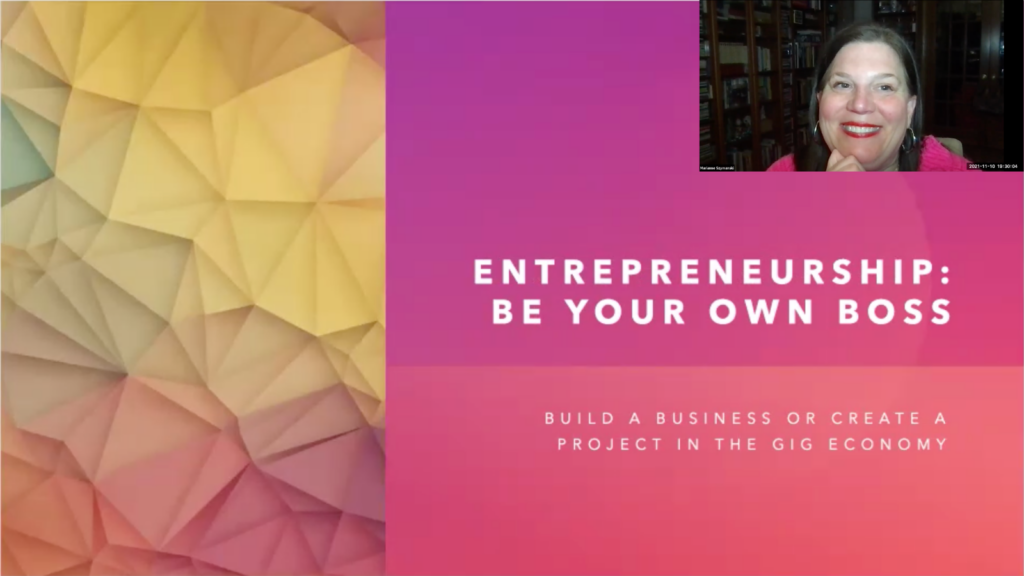Career Services offers Entrepreneurship Workshop for Dancers
November 22, 2021

Marianne Szymanski, an Adjunct Professor of Entrepreneurship at the USC Marshall School of Business, presents to USC Kaufman students about entrepreneurship | Photo courtesy of USC Kaufman Career Services
On Nov. 10, USC Glorya Kaufman School of Dance’s Career Services team hosted a virtual presentation on entrepreneurship for dancers and other artists. Marianne Szymanski, an Adjunct Professor of Entrepreneurship at the USC Marshall School of Business, spoke at the event where she advised students on how to become an entrepreneur and start their own businesses.
Szymanski’s background in entrepreneurship
Szymanski comes from a seasoned background in entrepreneurship. At 23 years old, while working as a sales representative for LEGO®, she decided to start her own business to test and research toys. This became Toy Tips, which guides parents and other consumers on smart toy purchases through reviews and other publications. Today, she has expanded past Toy Tips to become a professor, business coach and media personality as a renowned name in the business world.
According to Szymanski, her job as a professor is to motivate students to launch their ideas. While students may come into her class with a new business idea but sizable doubt about its success, she strives to take them from “no” to “go.” To do this, she explained that the idea must check two boxes. It must be viable, or able to sell, and profitable.
“The biggest problem that I find in entrepreneurship is that people have ideas and they say, ‘Oh, I wish I would have done that,’ or ‘Oh, I had that idea.’ You don’t want to be that person,” Szymanski said. “You always want to be the person that thinks of it and thinks their way through it.”
Entrepreneurship tips for creatives
In the beginning of the presentation, Szymanski posed the question: “What is the biggest risk when forming a business?” While students gave answers about funding, intellectual property and more, she revealed that the biggest risk is “you.” Szymanski explained that motivation and accountability for progress and success must come from the individual. Without these traits, the business will struggle to advance.
In speaking to dancers at USC Kaufman, Szymanski sees their creativity as an asset in coming up with new business ideas. She noted that these ideas often come from personal skill sets or interests that could one day form an actual business.
“As performers, you’re learning your craft, but there’s so much more. Like athletes, you are your own brand,” Szymanski said. “As you grow as a person and as you grow as a student, you may come up with an idea that maybe has nothing to do with dancing, but everything to do with dancers. It could be a way to promote the industry in a different way or a product that you can build upon for dancers.”
The need for networking
Szymanski also acknowledged the importance of curating a professional network for entrepreneurs. She advised students to start networking by creating LinkedIn profiles. Szymanski encouraged them to message people in their industries of interest to set up informational chats. These conversations can create mentors for the students, which broadens their networks. She also told students to take advantage of the USC Trojan Family Network as alumni are often eager to help young students break into the professional world.
“It’s all about the unknown, so take a leap and seek out a mentor,” Szymanski said. “If you don’t know who you want to talk to, bring it up to your professors. Find the professor that you really connect with or any professor that you think can help you because that’s why we teach. We want you to succeed. We want to help you, and we want to share our resources. I can tell you, every professor at USC feels that way so don’t be shy in that department.”
Learning from failure
While the prospect of failure looms for any entrepreneur, Szymanski encourages her students to not be afraid of it. She sees this outcome as a necessary learning opportunity for many new businesses.
“To fail in a business is not bad,” Szymanski said. “I know that no one wants to do that, but the reason you fail is to learn and grow. I look at it as a success turned inside out, but it might teach you things on how you can build your business in a new way as well.”
By Brigid Murphy